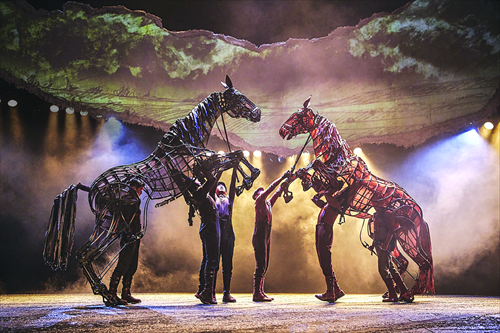HOME >> ARTS
Chinese version of ‘War Horse’ returns to the Beijing stage
By Zhang Yuchen Source:Global Times Published: 2016/8/1 19:18:39

Illustration: A scene from the Chinese version of War Horse Photo: Courtesy of National Theatre of China
Joey, the life-sized puppet star of War Horse, has once again caused quite a stir in Beijing as the Chinese version of the well-known theater production kicked off its second tour of the mainland on Friday.
Since its premiere ignited a craze in 2015, the Chinese version of War Horse has performed some 190 times around China, including Beijing, Shanghai, Tianjin and Harbin, Heilongjiang Province; and also took part in an international festival in South Africa.
While international cooperation is nothing new for China, the production of the Chinese version of War Horse has brought collaboration between the national theaters of China and Britain to an all new level when it comes to methodology, technology and artistic license.
Dedication to quality
"Joey is a puppet horse. So our first technological difficulty is how to make him come alive," Liu Xiaoyi, the show's director of puppeteering told the Global Times.
Liu still gets excited when talking about his experiences learning how to handle the show's puppets. To master the skills needed, the puppeteering team went through a year and a half training period that started with them living on a stud-farm.
"We lived with horses for more than a month, observing their every move, feeding them, showering them, cleaning the stables... pretty much everything relate to horses," Liu recalled.
In addition to learning the habits and behavior of horses, the puppeteers were required to learn more intimate knowledge such as a horse's digestive, reproductive and nervous systems - all of which they learned from the trainers on the UK team.
"It is totally different from our traditional Chinese puppetry. They want to create a real horse. To have us make our puppet alive and breathing," Liu Xiaoyi enthused.
For Liu Yang, one of the two directors on the Chinese team, the collaboration goes beyond the technical aspects.
"This actually is an evolved version of the original," Liu told the Global Times.
"We've changed a few things to make the play better suit the tastes of Chinese people. We've also made our own improvements to the way the show is run."
Liu recalled the very detailed plan they came up with when production on the show first started. She said he is still impressed by the UK team's systematic way to manage the show, which she thinks is the most significant contribution War Horse has made to Chinese theater.
"They are good at self-reflection. They have a working handbook and a tech handbook, in which they have noted down their entire creative process, including the problems they solved and their personal feelings."
According to Liu, what inspired her the most is how the teams worked hard to ensure the quality of the production as a whole.
"Production teams working on stage plays in China can be very emotional when it comes to problems. But the UK team has a very organized management system that helps every department work together very actively and effectively, while maintaining the crew's passion for creativity," Liu told the Global Times.
Breaking barriers
Of course the crew did encounter difficulties when it came to the production, one of these being the language barrier.
During the show's first tour, the crew noticed that during the scene in which German soldiers appeared for the first time the audience would start murmuring as they tried to differentiate between the British POWs, the German soldiers and the French civilians.
In the English version of the show, each of these groups speak with a specific accent to show where they are from, but this would be difficult to do in Chinese.
"They distinguish different nationalities by speaking English in different accents. But in the Chinese adaptation, it would be very weird if we used different local dialects," Deng Yang, who plays the character Stewart, told the Global Times.
Their solution was to incorporate more body language and rely on different tones of voice to differentiate the different groups.
In addition to helping the audiences keep track of the different nationalities of the characters, this exaggerated style also had an unexpected benefit: Since this had a comedic effect, children seemed to enjoy the show more.
Localizing the script also took some effort. According to a report on english.cri.cn, UK team director Alex Simms once expressed that he was worried that Chinese audiences might become confused because they weren't as familiar with French and German culture as Europeans are.
"Working with the Chinese directing team and the translator, we managed to find Chinese idioms to replace English, French or German colloquialisms," Simms said.
Although the English version of the play has won a Tony Award, Liu explained that the crew is not that focused on winning anything in China.
"I'm not quite sure that we can judge a stage play by a certain award," she said.
"Definitely, all artists want a lot of people to enjoy his or her works, but I think what's more important is the process itself. If you can ensure the quality in everything you do, then the results will not be bad."
Newspaper headline: Joey is back
Posted in: Theater